PFAS Testing in Maine
This week’s announcement about Federal PFAS Regulation by the EPA, on the heels of local news reports regarding the prevalence of these chemicals being found in environmental samples throughout New England, have many well owners, businesses, and schools questioning whether they need to test, or retest, their drinking water for PFAS and other contaminants.
All Public Water Systems (PWS) in the United States must test and treat water per the rules set forth by EPA’s National Primary Drinking Water Regulations
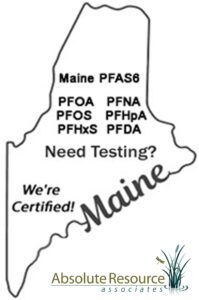
(NPDWR), but the PFAS class of chemicals had been unregulated at the Federal level thus far, earning only “health advisory levels.” However, EPA’s March 14, 2023 announcement proposes NPDWR for six PFAS (PFOA, PFOS, HFPO-DA, PFNA, PFHxS, PFBS), with implementation details expected by the end of this year. The implications of this will be far reaching.
Maine is one of several states that did not want to wait on EPA’s PFAS action plan, choosing to establish their own PFAS regulation measures back in 2021. The new EPA proposal is more stringent than Maine’s current “PFAS6” regulation, but until the federal limits are signed into law, Maine will likely continue with its current plan (MCL of 20 ng/L (sum) for PFDA, PFHpA, PFHxS, PFNA, PFOS, and PFOA).
In 2021, Maine mandated that PWS, Schools & Child Care Providers add PFAS to the list of required drinking water tests, and Maine lawmakers have been praised for also passing regulation related to the manufacture and sale of products with “intentionally added” PFAS, also in 2021.
Since more than half of the homes in Maine get their water from a private well, those homeowners are left to decide whether to add PFAS to their routine testing panel, and if detected, foot the bill for remediation measures.
Because of increased demand and a lack of in-state accredited labs, news reports are saying that PFAS testing in Maine can take up to 2 months and cost $300-$400 per sample. However, just over the border in Portsmouth, NH, ARA currently offers PFAS analysis to Maine residents and businesses for lower cost, and results typically take just 2 weeks.
There are no PFAS subcontracting fees with ARA, since PFAS analysis is done on site at our certified lab, and sampling kits can be shipped throughout Maine by using our water testing kit request form. *Conditions may apply, contact us for details.
Mainers living in proximity to former licensed seepage / sludge land application sites have been encouraged to have their water tested for PFAS in addition to the “standard test package” (which includes bacteria, nitrate, nitrite, arsenic, uranium, iron, manganese, fluoride, pH, and lead). Click the Maine map to learn more, including available resources for grant and rebate funding.
If you have questions or would like to have your water tested (in ME, NH, MA, RI, or VT), give us a call.
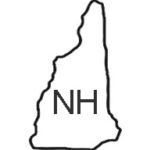 PFAS Exceedance in NH? Did You Know?
PFAS Exceedance in NH? Did You Know?
NHDES has a PFAS Rebate Program for qualified private well users in NH, for up to $5,000 for PFAS treatment or up to $10,000 for connection to a public water system.
ARA Offers Asbestos Inspections in Rhode Island
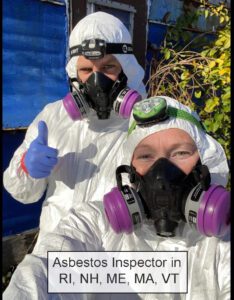
Those of you familiar with our awesome Indoor Air Quality Team will be happy to hear that we are now a certified Asbestos Inspector in Rhode Island (as well as NH, ME, MA and VT).
Because of the health risks involved, asbestos detection, sampling, testing and removal (abatement) should only be performed by certified Indoor Environmental Professionals (IEPs).
Our highly trained IAQ Team at ARA follows all asbestos protocols set forth by state and federal law, and we always strive to keep our clients (and our employees!) safe from asbestos exposure. We are licensed to perform asbestos detection, sampling, and asbestos consulting services. If you have questions about asbestos services for your next project, give us a call.
Get the Lead Out and the “Lead & Copper Rule”
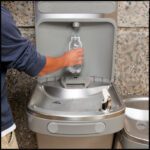 Are you with a NH based school or Public Water System and confused about the difference between the Federal “Lead & Copper Rule” (LCR) and the NHDES Lead in Drinking Water Program (aka “Get the Lead Out NH”)? You’re not alone. From sample size requirements and test frequency, to action limits and who pays for testing, there are many variables to consider!
Are you with a NH based school or Public Water System and confused about the difference between the Federal “Lead & Copper Rule” (LCR) and the NHDES Lead in Drinking Water Program (aka “Get the Lead Out NH”)? You’re not alone. From sample size requirements and test frequency, to action limits and who pays for testing, there are many variables to consider!
That is why the NHWWA and NHDES have created an educational flyer to explain key differences between the two programs; check it out here. And if you need water testing, you know who to call!
Our Recent Vapor Intrusion Project
Our chemists love working the lab, but when an opportunity arises to head out into the field to practice chemistry ‘in the wild,’ some jump at the chance. Willie and Cliff were thrilled to work on a recent project that involved soil vapor testing near an old gas station. 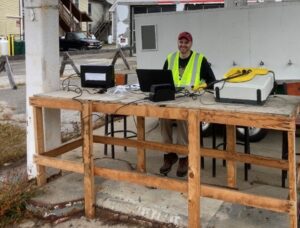
Our client needed to determine the extent gasoline vapors may have spread to the surrounding area. Using a portable GC/MS (HAPSITE®), Willie spent a full day determining if fuel components such as benzene, ethylbenzene, and naphthalene were present near the site.
The information gathered was used to help our client determine the next steps for the project. The portable GC/MS gives the ability to make sampling decisions based on results of samples collected just minutes ago. As with most of our work, we are not able to reveal specifics, except to say that the results were not quite what was expected. This is just another example why reliable lab data are so important for our clients!
For more information about Vapor Intrusion visit: www.epa.gov/vaporintrusion, and give us a call if you would like to inquire about pricing and availability for our portable GC/MS services.
The Resource Rambler Newsletter is brought to you by your friends at Absolute Resource Associates. ©


